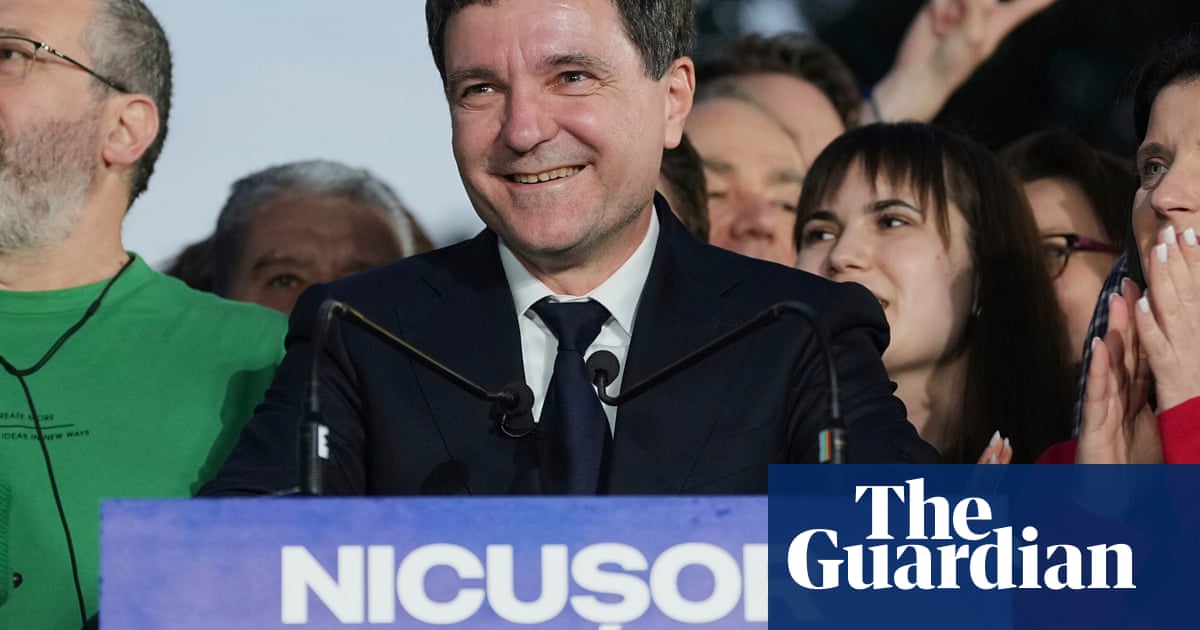Romania’s new president, a modest but driven maths prodigy who made a name for himself fighting corrupt property developers in Bucharest before becoming the capital’s crusading mayor, is expected to keep his country firmly on its pro-European track.
Nicușor Danwon Sunday’s rerunagainst the ultranationalist George Simion by a convincing seven-point margin – despite only entering it after the original vote,won by another far-right firebrand, wascancelled over fears of Russian meddling.
Romania was in the most difficult situation it had faced since the fall of communism in 1989, he said then. Fed up with corrupt and ineffective institutions, its citizens needed a “fundamental change in how the state responds to their expectations”.
Whether he will succeed in delivering that change is another question, but analysts say Dan, 55, is determined enough to give it a good try. He appealed passionately on Monday for “specialists, people in civil society, new people” to join in and help.
Born in the central city of Făgăraș, Dan is a brilliant mathematician, having won gold at the International Maths Olympiads in the 1980s. He earned a master’s degree from France’s prestigious École Normale Supérieure and a PhD from the Sorbonne.
Back in Romania, he became deeply involved in civic activism, campaigning effectively against corrupt and illegal high-rise property development in central Bucharest and to preserve the capital’s historic buildings and green spaces.
As head of his Save Bucharest association, Dan won nearly two dozen high-profile lawsuits against local authorities, significantly raising his public profile and preparing the ground for a run at city hall, which succeeded at the third attempt in 2020.
In 2016, aiming to capitalise on the campaigning reputation that brought him second place in that year’s mayoral elections with more than 30% of the vote, he co-founded the anti-corruption Save Romania Union (USR) as a national political platform.
The new party became the country’s third-largest in the 2016 general election and Dan was elected as an MP. He quit the USR a year later, however, over a row about its policy on a gay marriage referendum proposed by an anti-LGBT association, which proposed that marriage should be “between a man and a woman” and against which many in USR wanted to campaign.
Dan did not feel the party should get involved in the plebiscite, arguing it must maintain its focus on fighting corruption and remain open to progressives and conservatives, so he left. He has been independent ever since.
“He’s a liberal with quite a conservative touch,” said Cristian Preda, a professor of political science at the University of Bucharest, who likened the new president’s calm, analytical, methodical approach to that of the former German chancellor Angela Merkel.
“Politically, he’s more aligned with a party like Germany’s Christian Democrats (CDU) than with the centrist liberals of Renew, which is the European political group the USR belongs to. He’ll get on very well with the new chancellor Friedrich Merz.”
In a country that sees its political class as corrupt and ineffective, analysts say his relative lack of national political experience played to his advantage, as did his modest lifestyle: he lives in three rented rooms in a run-down district of Bucharest.
“Nicușor Dan has never had any integrity issues or been accused of corruption,” thepolitical analyst Costin Ciobanu told Balkan Insight. “He is perceived as an honest politician, and he presents himself as an anti-establishment politician.”
As an independent two-term mayor, however, Dan has experience in negotiating effective majorities. “He really got a lot done as mayor,” Preda said. “He completely renewed the city water pipes, the tramways … He tackles big projects, gets stuck in.”
Dan is not, he admits, “the greatest of communicators”, but says he is learning fast – and his softly spoken, quietly persuasive style proved highly effective against the more impetuous, Maga-like Simion, whom he demolished in a major TV debate.
Dan was unique in Romania, said Claudiu Tufiș, a political scientist, because he “has not taken the traditional route – he’s from civil society. That has certain advantages, but also disadvantages”. Other commentators praise his authenticity and transparency.
But while he may advocate profound changes at home, including rooting out corruption and pushing through major fiscal reform, the new president – to the relief of almost all of the EU’s leaders – has no plans whatsoever to alter foreign policy.
He strongly backs Romania’s EU and Nato membership, and has said support for Ukraine is vital for the country’s own security against a growing Russian threat.
